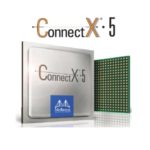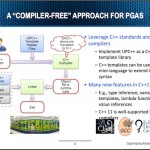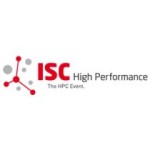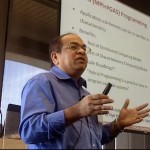The first Joint International Workshop on Parallel Data Storage and Data Intensive Scalable Computing Systems (PDSW-DISCS’16) has issued its Call for Papers. As a one day event held in conjunction with SC16, the workshop will combine two overlapping communities to to address some of the most critical challenges for scientific data storage, management, devices, and processing infrastructure. To learn more, we caught up with workshop co-chairs Dean Hildebrand (IBM) and Shane Canon (LBNL).
Slidecast: Announcing Mellanox ConnectX-5 100G InfiniBand Adapter
“Today, scalable compute and storage systems suffer from data bottlenecks that limit research, product development, and constrain application services. ConnectX-5 will help unleash business potential with faster, more effective, real-time data processing and analytics. With its smart offloading, ConnectX-5 will enable dramatic increases in CPU, GPU and FPGA performance that will enhance effectiveness and maximize the return on data centers’ investment.”
EuroMPI Conference Partners with Women in HPC to Bolster Diversity
Over at the Women in HPC Blog, Daniel Holmes from EPCC writes that the EuroMPI Conference is partnering with Women in HPC to increase diversity in high performance computing.
Video: UPC++ Parallel Programming Extension
In this video from the 2016 OpenFabrics Workshop, Zili Zheng from LBNL presents: UPC++. “UPC++ is a parallel programming extension for developing C++ applications with the partitioned global address space (PGAS) model. UPC++ has demonstrated excellent performance and scalability with applications and benchmarks such as global seismic tomography, Hartree-Fock, BoxLib AMR framework and more. In this talk, we will give an overview of UPC++ and discuss the opportunities and challenges of leveraging modern network features.”
Jeff Squyres on Building Community at OpenHPC
“As a community, we are excited about enabling HPC for everyone. If OpenHPC can really make it so easy to install HPC systems that more people join the ecosystem – as users, system administrators, resource managers, or developers – we all win.”
Intel MPI Messaging Paper Wins ISC 2016 Hans Meuer Award
Today ISC 2016 announced that a research paper in the area of Message Passing Interface (MPI) performance, has been selected to receive the 2016 Hans Meuer Award. The awarding will take place at the ISC High Performance conference on Monday, June 20.
Slidecast: How to Make MPI Awesome – MPI Sessions
In this slidecast, Jeff Squyres from Cisco Systems presents: How to make MPI Awesome – MPI Sessions. As a proposal for future versions of the MPI Standard, MPI Sessions could become a powerful tool tool to improve system resiliency as we move towards exascale. “Now that we have brought these ideas to a larger audience, my hope is that we (the Forum) start refining these ideas to fit them into a future release of the MPI standard. Meaning: please don’t assume that exactly what is proposed in these slides are going to make it into the MPI standard.”
Video: Programming Models for Exascale Systems
“This talk will focus on programming models and their designs for upcoming exascale systems with millions of processors and accelerators. Current status and future trends of MPI and PGAS (UPC and OpenSHMEM) programming models will be presented. We will discuss challenges in designing runtime environments for these programming models by taking into account support for multi-core, high-performance networks, GPGPUs, Intel MIC, scalable collectives (multi-core-aware, topology-aware, and power-aware), non-blocking collectives using Offload framework, one-sided RMA operations, schemes and architectures for fault-tolerance/fault-resilience.”
Exascale Architectures: Evolution or Revolution?
In this special guest feature, Earl Joseph from IDC describes his SC15 panel where four HPC luminaries discussed, disputed, and divined the path to exascale computing. “As the panel wound to a close, participants agreed on one thing: the path to exascale contains significant obstacles, but they’re not insurmountable. Tremendous progress is being made in preparing codes for the next generations of systems, and sheer determination and innovation is running at an all-time high.”
Changes Afoot from the HPC Crystal Ball
In this special guest feature from Scientific Computing World, Andrew Jones from NAG looks ahead at what 2016 has in store for HPC and finds people, not technology, to be the most important issue. “A disconcertingly large proportion of the software used in computational science and engineering today was written for friendlier and less complex technology. An explosion of attention is needed to drag software into a state where it can effectively deliver science using future HPC platforms.”













